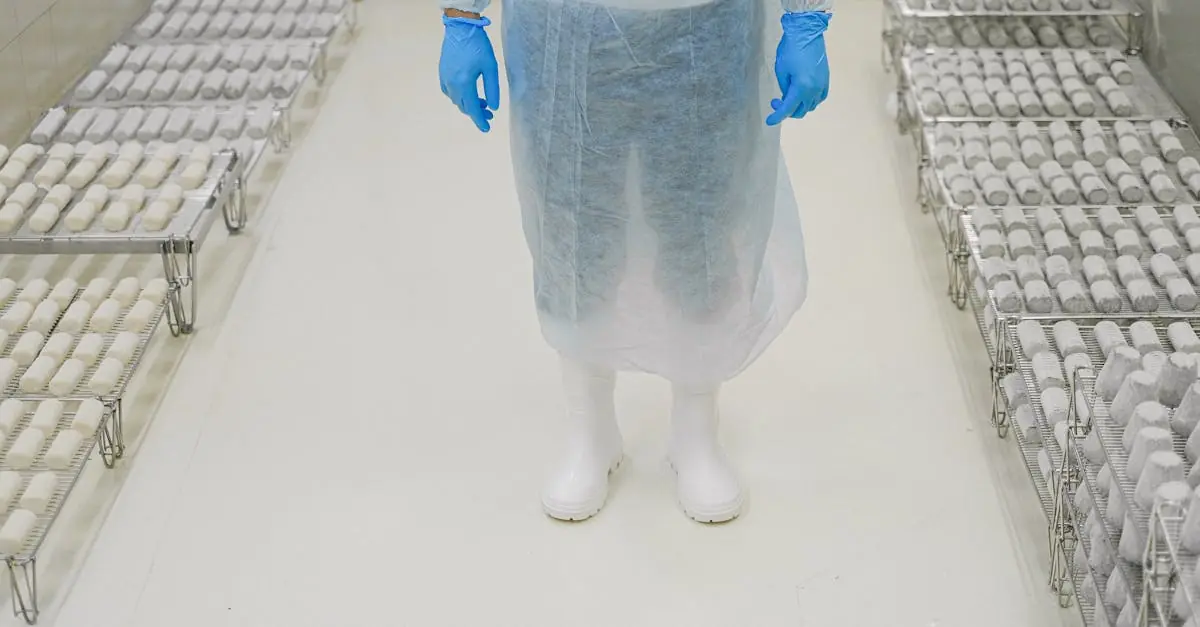Table of Contents
ToggleBiotech engineering is where science meets creativity, and the results are nothing short of mind-blowing. Imagine a world where crops can withstand droughts, diseases can be tackled with precision, and even your favorite snack can be made healthier. Sounds like a sci-fi movie, right? Well, it’s happening right now in labs around the globe.
Overview Of Biotech Engineering
Biotech engineering integrates biological and technological processes to create solutions that impact various sectors. This dynamic field encompasses genetic engineering, molecular biology, and bioinformatics. Techniques include genetic modification, where scientists alter the DNA of organisms to enhance desired traits. Such modifications contribute to developing crops that withstand pests, diseases, and extreme weather.
Applications span agriculture and medicine. In agriculture, biotech engineering leads to the creation of drought-resistant plants and higher-yielding varieties. For example, genetically engineered corn has shown significant resilience against environmental stressors, resulting in increased food production. In medicine, biotech engineering facilitates the production of biopharmaceuticals, vaccines, and diagnostic tools. These innovations target specific diseases, improving patient outcomes and streamlining treatment protocols.
Research and development play crucial roles. Laboratories worldwide focus on pioneering technologies that can lead to breakthroughs. Collaborations often occur between universities, research institutions, and private companies to expedite the innovation process. Moreover, regulatory frameworks ensure that biotech advancements are safe and effective, addressing public concerns about genetically modified organisms.
Education in this field encompasses interdisciplinary studies, combining biology, chemistry, and engineering principles. Graduates often pursue careers in pharmaceuticals, agriculture, and environmental science. This range of opportunities highlights the field’s growth and relevance, showcasing its importance in tackling global challenges related to food security and health care.
Key Applications Of Biotech Engineering
Biotech engineering showcases a wide array of applications across various sectors. This technology plays a vital role in enhancing health, improving agricultural practices, and fostering environmental sustainability.
Medical Biotechnology
Medical biotechnology focuses on developing biopharmaceuticals, vaccines, and gene therapies. It enables the production of targeted treatments for diseases such as cancer and diabetes. Techniques like recombinant DNA technology facilitate the creation of insulin and monoclonal antibodies. Diagnostic tools, including genetic testing, allow for early disease detection. These advancements contribute to improved patient outcomes and personalized medicine, responding to individual health needs.
Agricultural Biotechnology
Agricultural biotechnology addresses challenges in food production and sustainability. Genetic modification techniques create crops that resist pests, diseases, and environmental stressors. Drought-tolerant varieties enhance yield in harsh climates. Biofortification improves nutritional content, thus combating malnutrition. These innovations ensure food security and support farmers in meeting global demand for healthier food options.
Environmental Biotechnology
Environmental biotechnology utilizes biological processes to remediate pollution and promote sustainability. Microbial bioremediation employs microorganisms to break down hazardous substances in contaminated sites. Wastewater treatment systems harness biological processes to purify water, enhancing ecosystem health. Additionally, biofuels produced through biotechnology provide renewable energy sources. These efforts lead to reduced carbon footprints and strive for a more sustainable future.
Emerging Trends In Biotech Engineering
Biotech engineering continues to evolve, showcasing innovative advancements that enhance various sectors.
CRISPR Technology
CRISPR technology revolutionizes gene editing, enabling precise alterations to DNA sequences. Researchers utilize this method to target specific genes with accuracy, significantly improving agricultural practices. This technique allows for the development of crops that can survive harsh climates and resist pests. In the medical field, CRISPR shows promise in treating genetic disorders, providing new avenues for therapies that were once considered unapproachable. The ability to efficiently edit genes positions CRISPR at the forefront of biotechnology innovation.
Synthetic Biology
Synthetic biology blends engineering principles with biology to design and construct new biological parts and systems. This discipline emphasizes the creation of custom organisms with tailored functionalities. For instance, synthetic biology enables the production of biofuels from engineered microorganisms, providing sustainable energy solutions. Applications extend into pharmaceuticals, where engineered bacteria can produce useful compounds more efficiently. The integration of synthetic biology into biotech engineering propels advancements that address global challenges effectively.
Challenges In Biotech Engineering
Biotech engineering faces various challenges, encompassing ethics and regulations that impact development and implementation.
Ethical Considerations
Ethical concerns permeate the field of biotech engineering. Issues arise regarding genetic modification, especially in humans and animals. Questions about environmental impact linger, particularly around biodiversity loss and gene transfer to wild species. Furthermore, debates continue about equity in access to biotechnological advancements, which can create disparities in health care and agricultural productivity. Stakeholders must engage in discussions that promote transparency and public engagement. Fostering understanding and addressing concerns about ethical practices represents a crucial step for acceptance.
Regulatory Issues
Regulatory frameworks play a significant role in the advancement of biotech engineering. Each country has specific regulations governing the development and release of genetically modified organisms. Complex approval processes can delay innovations, hindering timely solutions for pressing challenges. Moreover, inconsistencies between countries create barriers for international collaboration. Compliance with safety standards is essential to ensure consumer trust. Regulatory bodies must adapt to emerging technologies while balancing innovation with public safety. Engaging with these regulations effectively promotes responsible biotechnology practices.
Future Of Biotech Engineering
Innovative biotechnological advancements promise transformative changes in multiple sectors. Genetic engineering techniques like CRISPR facilitate precise editing, enabling crops to thrive under challenging environmental conditions and allowing the development of personalized medicine. Emerging biopharmaceuticals target diseases more effectively, improving treatment outcomes and offering hope for previously untreatable conditions.
Synthetic biology stands out as a game-changer for sustainable solutions. Custom organisms can produce biofuels, reducing reliance on fossil fuels, while enhancing pharmaceutical production efficiency. The focus on biomanufacturing will likely lead to cost-effective production processes, benefiting both consumers and the economy.
Research collaborations drive innovation further. Partnerships between universities, research institutions, and private companies lead to groundbreaking discoveries, paving the way for new biotech applications. Regulatory frameworks adapt to accommodate these advancements while ensuring public safety, although ethical considerations remain a priority.
Ethical discussions around genetic modification persist, especially regarding human applications. Transparency is essential for addressing public concerns, and education plays a vital role in fostering informed discussions. Incorporating ethics into biotech training programs ensures that future engineers are equipped to navigate complex moral landscapes.
Prioritization of sustainability and global health challenges underscores the relevance of biotech engineering. Solutions addressing food security, environmental restoration, and health care disparities will shape the future landscape of this dynamic field. Advancements are continually redefining what’s possible, and the commitment to responsible practices will be pivotal in gaining public trust and acceptance.
Biotech engineering stands at the forefront of innovation with its ability to address pressing global challenges. The integration of advanced technologies like CRISPR and synthetic biology is paving the way for sustainable agricultural practices and personalized medical treatments. As the field continues to evolve, collaboration among researchers and regulatory bodies will be crucial for ensuring safety and efficacy.
Ethical considerations will also play a significant role in shaping public perception and acceptance of these advancements. By prioritizing transparency and education, the biotech engineering community can foster trust and encourage responsible practices. The future holds immense potential for this dynamic field, promising solutions that not only enhance human health but also promote environmental sustainability.






